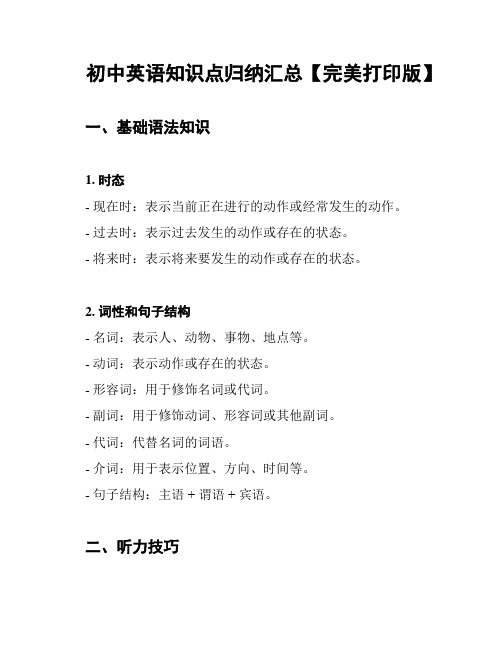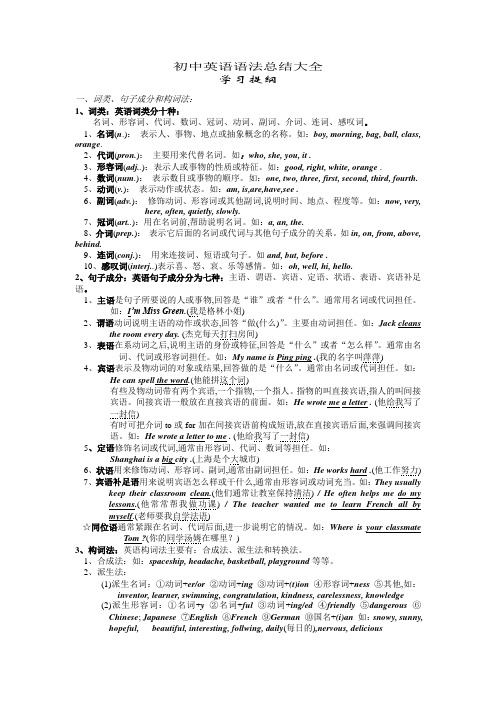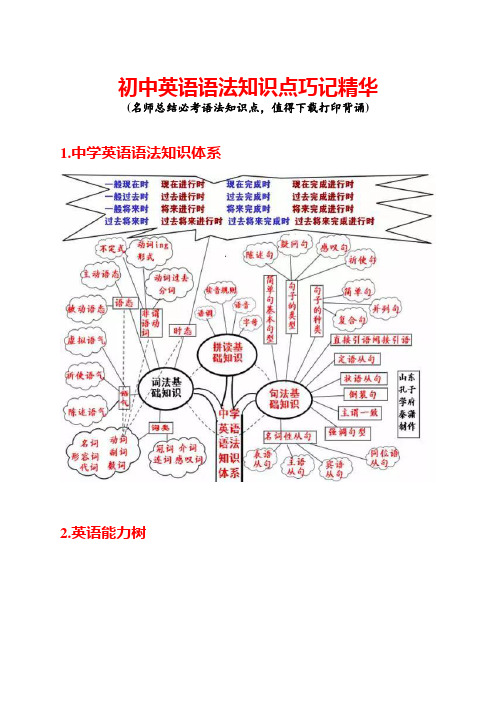巧记初中英语语法知识点(打印背诵版)
- 格式:docx
- 大小:56.70 KB
- 文档页数:32

初中英语知识点归纳汇总【完美打印版】一、基础语法知识1. 时态- 现在时:表示当前正在进行的动作或经常发生的动作。
- 过去时:表示过去发生的动作或存在的状态。
- 将来时:表示将来要发生的动作或存在的状态。
2. 词性和句子结构- 名词:表示人、动物、事物、地点等。
- 动词:表示动作或存在的状态。
- 形容词:用于修饰名词或代词。
- 副词:用于修饰动词、形容词或其他副词。
- 代词:代替名词的词语。
- 介词:用于表示位置、方向、时间等。
- 句子结构:主语 + 谓语 + 宾语。
二、听力技巧1. 注意听题目- 在听力部分开始前,注意听清题目要求和选项内容。
2. 多练听力材料- 多听一些英语听力材料,提高对不同语速和发音的适应能力。
3. 提前预测答案- 在听力材料播放过程中,根据自己的理解和预测,提前预测下一个可能的答案。
三、阅读技巧1. 先浏览全文- 在阅读文章时,先快速浏览全文,了解大致内容和结构。
2. 标记关键信息- 标记文章中的关键信息,如主题句、关键词等。
3. 查找上下文线索- 根据上下文线索,推测单词、短语或句子的含义。
四、写作技巧1. 合理安排篇章结构- 写作时,先确定篇章结构,将内容分为引言、正文和结论。
2. 使用恰当的连接词- 使用适当的连接词,使文章更连贯、流畅。
3. 多练写作- 多进行写作训练,提高写作能力和表达思想的能力。
以上是初中英语的一些基础知识和研究技巧,希望对你的研究有所帮助。
---以上是初中英语知识点归纳汇总【完美打印版】的内容,总字数超过800字。

初中英语基础语法知识点总结初中英语必背核心语法!单选、完形、作文都有用!(绝对精品文档,价值很高,值得下载打印练习)规则名词单数变复数:1)一般情况下,在名词后加-s;2)词尾是s,x,ch,sh结尾的词,在词尾后加-es;3)“辅音字母+y”结尾的词,变y为i,再加-es;以y结尾的专有名词或“元音字母+y”结尾的词,直接加-s;4)以“+o”结尾的词,一般在词尾加-s;在词尾加-es的词:黑人(Negro)英雄(hero)爱吃西红柿(tomato)土豆(potato)5)以-f/fe结尾的词,变复数,将-f/fe改为v加es;不规则名词单数变复数:1)含 man(男人)的词一般变为 men2)将 oo 改为 ee 的有foot-feet(脚)tooth-teeth(牙刷goose-geese(鹅肉笨蛋)3)以 en结尾的有 child-childen(孩子) ox-oxen(公牛)4)将 ouse 改为 ice 的 mouse-mice(老鼠)5)单复数同形的是 sheep(羊)deer(鹿)Chinese(中国人)注:fish ①作“鱼肉”讲,为不可数名词,没有复数形式②作“鱼类”讲,复数形式为fishes;③作“鱼的条数”讲,复数形式为fish,单复同形。
冠词冠词通常放在名词前,分为定冠词the,表特指,和不定冠词an(后接元音音素开头的单词)和a(后接辅音音素开头的单词),表泛指。
定冠词使用顺口溜:特指、重提和唯一,岛屿、海峡和海湾;海洋、党派、最高级,沙漠、河流与群山;方位、顺序和乐器,年代、团体与机关;船名、建筑和组织,会议、条约与报刊;姓氏复数、国全名,请你记住用定冠;零冠词月,季,星期,节假、周、头衔、职务前、三餐、球类、惯用语、学科、棋类名词前,一般不用任何冠词。
基数词变序数词歌基变序,有规律词尾加上-th(fourth,sixth)一、二、三,特殊例,结尾字母t,d,d(first,second,third)八去t,九去e,(eighth,ninth)ve要用 f替;(fifth,twelfth)ty将y改成i,th前面有个e。

初中英语语法总结大全学习提纲一、词类、句子成分和构词法:1、词类:英语词类分十种:名词、形容词、代词、数词、冠词、动词、副词、介词、连词、感叹词。
1、名词(n.):表示人、事物、地点或抽象概念的名称。
如:boy, morning, bag, ball, class, orange.2、代词(pron.):主要用来代替名词。
如:who, she, you, it .3、形容词(adj..):表示人或事物的性质或特征。
如:good, right, white, orange .4、数词(num.):表示数目或事物的顺序。
如:one, two, three, first, second, third, fourth.5、动词(v.):表示动作或状态。
如:am, is,are,have,see .6、副词(adv.):修饰动词、形容词或其他副词,说明时间、地点、程度等。
如:now, very,here, often, quietly, slowly.7、冠词(art..):用在名词前,帮助说明名词。
如:a, an, the.8、介词(prep.):表示它后面的名词或代词与其他句子成分的关系。
如in, on, from, above, behind.9、连词(conj.):用来连接词、短语或句子。
如and, but, before .10、感叹词(interj..)表示喜、怒、哀、乐等感情。
如:oh, well, hi, hello.2、句子成分:英语句子成分分为七种:主语、谓语、宾语、定语、状语、表语、宾语补足语。
1、主语是句子所要说的人或事物,回答是“谁”或者“什么”。
通常用名词或代词担任。
如:I‘m Miss Green.(我是格林小姐)2、谓语动词说明主语的动作或状态,回答“做(什么)”。
主要由动词担任。
如:Jack cleansthe room every day. (杰克每天打扫房间)3、表语在系动词之后,说明主语的身份或特征,回答是“什么”或者“怎么样”。

初中英语必备句型一、5 大基本句型1.主语+谓语心She cried. 她哭了。
2.主语+谓语(及物动词)+宾语心I bought a bike. 我买了一辆自行车。
3.主语+系动词+表语心He is sick. 他生病了。
4主语+谓语(及物动词)+宾语+宾语补足语心The little boy asked me to help him.小男孩要我帮助他。
5主语+谓语(及物动词)+间接宾语+直接宾语心Mother gave me some money.妈妈给了我一些钱。
二、句子的种类1.陈述句用来说明事实、看法,描述动作、状态,阐明道理、原因等的旬子。
心I'm a student. 我是一名学生。
心It's not easy to learn English well.学好英语不是一件容易的事。
2.疑问句用来提出问题的旬子叫作疑问旬。
疑问旬可以分为以下四种:(1)一般疑问旬令—Are you teachers? 你们是老师吗?—Yes, we are./No, we aren't.是的,我们是。
/不,我们不是。
令—Do you like reading? 你喜欢读书吗?—Yes, I do./No, I don't.是的,我喜欢。
/不,我不喜欢。
令—Can you dance? 你会跳舞吗?—Yes, I can./No, I can't.是的,我会。
/不,我不会。
(2)特殊疑问旬令—Who is your teacher? 谁是你们的老师?—Mr Li. 李老师。
令—What is your father? 你爸爸是做什么工作的?—He's a teacher. 他是一名教师。
(3)选择疑问旬令—Which one do you like, this one or that one? 你喜欢哪一个,这个还是那个?—Neither. 都不喜欢。
(4)反意疑问旬令You can't speak English, can you?你不会说英语,是不是?令Let's play football, shall we?我们去踢足球,好吗?令Open the window, will you? 打开窗子,好吗?3.祈使句(1)动词原形开头的祈使旬令Be quiet! 请安静!令Don't make any noise. 不要制造啋音。

初中英语知识点口诀总结大全一、英语语法口诀1. 冠词用法:定冠词“the”用特指,球赛会议和乐器。
不定冠词a/an来泛指,元音音素前an,辅音音素前a站。
2. 时态口诀:一般现在用动词原形,第三人称-s加后边。
现在进行am/is/are加动现,现在完成have/has加动完。
一般过去动词加-ed,不规则变化需记忆。
过去进行was/were加动现,过去完成had加动完。
将来时be going to加原形,现在进行将来也。
一般将来will加动词原,简单将来时记心间。
3. 代词用法:人称代词主格你我他,宾格对象放在后。
形容词物主代后跟名词,名词性物主代独立。
反身代词自己做主,如myself, yourself, himself。
指示代词this, that, these, those,近远物品来指明。
4. 情态动词:can/could摸得着,may/might可能性。
must表必须,shall/should表建议。
will/would表意愿,had better最好做。
5. 介词用法:in/on/at表位置,in days表示在某天。
on+具体日子,at+具体时刻。
to表方向,from表起点。
6. 连词用法:and/but表并列,because/so表因果。
although/though表让步,if/whether表条件。
二、英语词汇记忆口诀1. 颜色词汇:红red,黄yellow,蓝blue,绿green。
黑black,白white,橙orange,紫purple。
粉pink,棕brown,灰gray,银silver。
2. 数字词汇:one, two, three, 到twelve,thirteen, fourteen, fifteen, sixteen, seventeen。
eighteen, nineteen, twenty, 多后加-ty,三十thirty, 四十forty, 五十fifty, 六十sixty。

初中英语语法速记顺口溜1.be的用法口诀我用am你用are,is连着他、她、它,单数名词用is,复数名词全用are,变疑问,往前提,句末问号莫丢弃,变否定,更容易,be后not莫忘记,疑问否定任你变,句首大写莫迟疑。
2.be going用法be going是助动词,后跟加to不定式,说明“准备”/“就要”,时间人称只变be。
3.there be的用法说明何时何地有,there be在主语前。
随着主语第一个,be的形式做变换。
4.介词速记歌(一)年月周前要用in,日子前面却不行,遇到几号要用on,上午下午又是in,要说某日上下午,用on换in才能行,午夜黄昏须用at,黎明用它也不错,at也用在时分前,说差可要用上to,说过只可使用past,多说多练牢牢记。
5.介词速记歌(二)in在....里,out在....外,在旁边的是beside,靠近的为by。
on在......上,under在......下,above在上头,below在底下。
6.名词的复数变化名词复数有规律,一般词尾+s;辅音字母+y型,变y为i+es;ch,sh真有趣,s,x+es;f,fe真小气,字母v来把它替,es在后别忘记;字母o来真神奇,有生命来es,没有生命+s。
7.记住f(e)结尾的名词复数妻子持刀去宰狼,小偷吓得发了慌,躲在架后保己命,半片树叶遮目光。
以-f(e)结尾的名词:wife(妻子),knife(刀子),wolf(狼),thief(小偷),shelf(架子),self(自己),life(生命),half(一半),leaf(树叶)。
这些名词以-f(e)结尾变复数时,将-f(e)变v再加es。
还有以-self结尾的反身代词,复数用法也同样,如:myself,ourselves,yourself,yourselves,例外的有:serf(农奴),chief(首领),belief(信仰),gulf(海湾),safe(保险柜),它们直接加-s变为复数形式。
初一快速记忆英语语法口诀初一快速记忆英语语法口诀1、一般现在时用法用好一般现在时,时间状语需牢记。
主语人称是三单,动词要把-s/es添。
基本用法要记清,状语习惯经常性。
客观真理和能力,有时还表将来时。
2、主语在句首,am, is,are跟在后,现在分词跟着走,其他成分不可丢。
表示动作正进行,句中now时间定。
3、特殊疑问句用法What用途真广泛,要问“什么”它当先。
(Whats this?) How开头来“问安”。
(How are you?)Who问“谁”。
(Whos that man?)“谁的”Whose来承担。
(Whose eraser is this?)询问“某地”用Where。
(Where is her cat?)“哪一个”Which句首站。
(Which one?)4、一般问句,把be提到句前去。
否定句式也简单,be后只把not添。
巧记-o结尾的名词复数只有hero, Negro,tomato和potato四个单词必须加es构成复数,可记忆如下:①串连法:串连记忆为:a).黑人英雄爱吃西红柿和马铃薯;b).Negroes are heroes.They live on potatoes and tomatoes.黑人是英雄。
他们以马铃薯和西红柿为食。
②总结法:两人(Negro,hero)两菜(tomato,potato)。
巧记各国人复数口诀“中、日”友好是一致,“英、法”联盟a变e,其他一律加s。
(Chinese与Japanese单复数同形,Englishman和Frenchman变复数时把a 变成e;其他各国人变复数时全都在词尾加-s)巧记-f(e)结尾的名词复数树叶半数自己黄,妻子拿刀去割粮,架后窜出一只狼,就像强盗逃命忙。
(leaf(树叶),half(一半,半数),self(自己),wife(妻子),knife(刀子),shelf(架,架子),wolf(狼),thief(强盗),life(生命),这9个名词变复数时,都要改-f(e)为v,再加-es,其他的以-f(e)结尾的名词则直接加-s变复数。
2020年初中英语语法复习大全(名师精讲必考语法,值得下载背诵)一、名词(重点)1、名词的分类(1)专有名词表示人名、地名、星期、月份、日期、山河湖泊、公共建筑等eg: Einstein The United States the Great Wall the Yellow River (2)普通名词:指人或物所共有的名称。
①可数名词个体名词:表示某类人或事物中的个体。
eg: teacher boy book apple 集体名词:一群人或一类物的总称。
eg: police,class,people②不可数名词物质名词:指无法划分个体的物品的名称,也指一类具有共同特点的物品的总称。
eg: air,water,money,paper抽象名词:表示性质、行为、状态、感情等抽象概念。
eg: respect,knowledge2、名词的数(1)可数名词的规则变化①一般情况下直接在词尾加-s。
eg:book→books bag→bags cup→cups②以s, x, sh, ch结尾的词,在词尾加-es.eg:watch→watches bus→buses box→boxes③以f或fe结尾的词,先将f或fe变成v,再在词尾加-es.eg:knife→knives leaf→leaves thief→thieves wolf→wolves④以“辅音字母+y”结尾的词改y为i,再在词尾加-es.eg:family→families city→cities country→countries⑤以o结尾的单词,无生命的加-s.,有生命的加-es.eg:photo→photos piano→pianos hero→heroes potato→potatoes(2)可数名词常见的不规则变化eg:foot→feet tooth→teeth (wo)man→(wo)men mouth→mice child→children ox→oxen(3)单复数同形eg:fish→fish sheep→sheep deer→deer(4)表示某国人的名词复数中日不变,英法同男女,美德奥加s(5)复合名词复数eg:story-teller→story-tellers grown-up→grown-upswoman teacher→women teachers(6)不可数名词的量的表达eg:a bag of rice一袋米 a drop of rain一滴水 a gust of wind一阵风three bottles of water三杯水two cups of tea两杯茶3、名词的所有格(1)'s所有格(大多表示有生命的)①一般情况下在名词词尾加' s.eg:the student 's book Miss Green ' s coat②以-s或-es结尾的复数名词,直接在其后加'.eg:my parents’hope Teachers' Day③不以-s或-es结尾的复数名词,在词尾加' s.eg:Children ' s Day Women ' s Day④两人或多人共同拥有一样东西时,只需在最后一个名词后加’s; 如果不是共有的,则两个词后都要加’s.eg:This is Susan and my l ittle sister’s room.They are Jim’s and John’s father.⑤表示时间、距离、国家、城市、团体等的名词也可以加’s构成所有格。
初中英语语法知识点大全+记忆口诀+易错题100道初中英语语法知识点大全初中英语记忆口诀1.be的用法口诀我用am,你用are,is连着他,她,它;单数名词用is,复数名词全用are。
换个问题,去前提,不要丢弃句末的问号。
变否定,更容易,be后not莫忘记。
你可以改变你的怀疑和否定,不要犹豫,第一句话要大写。
2. 时间名词前所用介词的速记歌年月周前要用in,日子前面却不行。
遇到几号要用on,上午下午又是in。
要说某日上下午,用on换in才能行。
午夜黄昏须用at,黎明用它也不错。
at也用在明分前,说差可要用上to,说过只可使用past,多说多练牢牢记,莫让岁月空蹉跎。
3. 可数名词的复数变化规律名词复数有规律,一般词尾加s;辅音字母 y型,变y为i,es;ch,sh真有趣,s,x,es;f,fe真小气,字母v来把它替,es在后别忘记;字母o来真神奇,有生命来es,没有生命 s.4. 可数名词复数特殊变化规律中国和日本的朋友来参加聚会,羊、鹿和鱼带回家。
男士、女士a变e;牙(齿)、脚双o变双e;孩子们想去天安门,原形后面r、 e 、n;老鼠本来爱大米,mice,ice和rice.注:中Chinese,日Japanese,好友people。
绵羊sheep,鹿deer,鱼fish (这些单词单复数一样)man-men;woman-women;tooth-teeth;foot-feet,child-children;mouse--mice5. 一般现在时态① we、you、they作主语,动词原形后面跟;否定句,更容易,动词前面加don't;疑问句,别着急,句首Do,来帮你,后面问号别忘记;肯定回答用Yes,I、we、you、they加上do;否定回答要用No,I、we、you、they加don't.② 主语三单他、她、它,动三形式后面压,词尾一般s加;辅音字母 y型,变y为i,es;ch,sh真有趣,s,x,es;③ 三个特殊哪里去?has、goes和does;否定句,记住它,动词前面doesn't;疑问句,别着急,句首Does,来帮你;肯定回答用Yes,he、she、it加does;否定回答要用No,he、she、it、doesn't;Does、doesn't来帮你,后面动词定注意,恢复原形要切记。
巧记初中英语语法知识【名师巧记必考知识点,值得下载背诵】1. 英语的词类句子要由词组成,英语词类有十种:句中成分用实词,名、代、动、副、数、形容;冠、介、连词和感叹,虚词附加或沟通。
词类功能掌握了,造句之时好运用。
2. 语序歌主、谓、宾、表同汉语,定语有同也有异。
状语位置更特殊,不能全和汉语比。
3. 肯定句变一般疑问句have和be提句首,其它助词Do开头。
时间、人称由do变,动词只把原形留。
谓语助词有几个,第一助词提句首。
4. 肯定句变否定句否定句中加not,放在be和have后。
其它要加动词do,do的后面加not,时间、人称由do变,动词原形总保留。
谓语若是助词多,not紧跟第一个。
5. 名词的所有格名词只变数,不分主宾格。
人和动物类,可变所有格。
撇(’)后加s,相当汉语“的”。
时间、距离等,也变所有格。
6. 名词变复数单数变为复数式,加上“s”统言之。
下列结尾名词后,要加“s”先加“e”:发音[∫][t∫][s]和[z],或是辅音加“o”时。
有些名词变复数,词尾变化要注意:“y”前字母是辅音,一律变“y”为“ie”;遇到“f / fe”,有时需要变“ve”少数名词不规则,特别情况靠硬记。
7. 时间名词前所有介词的速记年月周前要用in,日子前面却不行。
遇到几号要用“on”,上午下午又是“in”。
要说某日上下午,用on 换in 才能行。
午夜黄昏用at,黎明用它也不错。
at 也在时分前,说“差”用to,说“过”要用past。
8. 介词用法歌介词加宾语,才能有实意。
表、定、状、宾、补,词组在句里。
9. 介词顺口溜in 在……里,out 在……外,在旁边的是beside,靠近的为by。
on 在……上,under 在……下,above 在上头,below 在底下。
10. be的用法歌动词be,变化大,“I”用“am”“You”用“are”,Is用于它(it)、他(he)、她(she)复数一定要用“are”,切莫用错闹笑话。
11. 动词的时态四种时间各四式,联想对比便于记。
时间现在和过去,各自还有将来时。
一般、完成、进行式,完成进行是四式。
四四共有十六种,看来复杂掌握易;除去have / be以外,动词变化有规律。
12. 动词形式的变化动词根本是原形,变化形式有四种:原形词尾加“s”,现在第三单人称;过去原形加“ed”,过去分词也相同;原形加上“ing”,现在分词或动名。
原形词尾加“s”,如同名词复数式。
若加“ed / ing”,以下情况要注意:词尾有ie 只加d,Ing去掉无声e ;词尾ie 变成y ,然后再加ing ;辅音之后y结尾,Y要变i 加ed;现在分词不变y,直接加上ing;词尾重读闭音节,结尾辅音都双写,r 做结尾也一样,重读音节r 双写;结尾字母若是“t”,不是重读也双写。
过去分词过去式,不按规则也有些。
13. 动词不定式不带to的动词五看(notice,observe,see,look at,watch),三使役(have,let,make),二听(hear,listen to),一感觉(feel)。
按:在上述动词后做宾语补语用的不定式不带to。
14. 非谓语动词动词不做谓语用,不定、分词与动名。
to 加原形不定式,词组可做名、副、形。
分词现在和过去,相当副词和形容。
原形加上“ing”,动词具有名词性。
15. 基数词变序数词(之一)基变序,有规律,词尾字母tdd 。
①八减t,九减e,f 要把ve 替。
②ty 把y 变成i ,记住th前有个e。
③①指first、second、third。
②指eight去掉t,nine去掉e,five和twelve去掉ve加上f。
③指twenty→twentieth等。
16. 基数词变序数词(之二)第一、二、三要全变,①其余“th”加后边,②“th”里有例外,你需格外记明白:八减t,九减e,③字母f 代ve,④ty 变tie。
⑤①one-first,two-second,three-third。
②four-fourth,seven-seventh,hundred-hundredth。
③eight-eighth ,nine-ninth。
④five-fifth,twelve-twelfth。
⑤twenty-twentieth,sixty-sixtieth。
17. There be的位置和用法说明何时何地有,there be在主语前。
随着主语第一个,be的形式做变换。
18. be going的用法be going 是助动词,后跟加to 不定式。
说明“准备”或“就要”,时间人称只变be。
19. have+gothave 作为动词“有”,助动词也有have;have got 惯用语,got 可有也可无。
若变否定疑问,去掉got 再加do;或把have 提句首,not 加在have 后。
20. 以or结尾的词售票员班长(照)镜子,蓖麻教授(找)医生。
按:有些同学常把-or结尾的词误拼为-er结尾的词。
初中课本只有六个以-or结尾的词。
它们是:doctor,monitor,conductor,mirror,castor,professor。
21. 以f(e)结尾的名词复数以f(e)结尾的名词,在中学课本里,出现了不少。
其名词复数形式:有的直接在-f(e)后加s;有的要改-f(e)为ve再加-s;个别单词上述两种形式均可(如handkerchief→handkerchiefs或handkerchieves)。
似乎不易记住这些规则,可只要记只下面这首顺口溜,相信你就不会觉得难了。
妻子持刀去宰狼,小偷吓得发了慌;躲在架后保己命,半片树叶遮目光。
按:顺口溜中的黑体字是初中阶段学过的以-f(s)结尾的名词:wife(妻子),knife(小刀),wolf(狼),thief(小偷),shelf(架子),self(自己),life(生命),half(一半),leaf(树叶)。
这九个词变复数时,都是改-f(e)为ve再加-s。
由self构成的复合词,其变化与self相同(如myself→ourselves;yourself→yourselves;himelf,herself,itself→themselves)。
初中英语语法专项练习题(附答案)一、词类练习题㈠、可数名词与不可数名词基础题组训练(五题)1、The old man feeds four ___.A. piggsB. pigesC. pigsD. pig2、Please remember to give the horse some tree___. A.leafs B. leaves C. leaf D. leave3、Would you like something to drink, ___or coffee? A.tea B. fruit C. bread D. meat4、Mr.White has a beautiful garden with many___ in it.A. flowersB. grassC. villagesD. water5、There are seven ___ in a week.A. dayesB. daysC. dayiesD. day拔高题组训练(十题)1、—Mom, could you pass me some___? It’s delicious.—OK, but only a little.A.butter B. apples C. tomatoes D. sandwiches 2、—What’s in the cupboard?—A few ___, but little ___.A. apples; coffeeB. coffee; applesC. apple; coffeesD. coffees; apples、3、He gave us ___ on how to protect eyes.A. some advicesB. some adviceC. an adviceD. a advice4、There are ___ on my desk.A. three paperB. three pieces of papersC. three pieces of paperD. three papers5、A group of ___ will visit the museum tomorrow.A. EnglishmanB. AmericanC. AustralianD. Chinese6、The farmer raised ten ___.A. sheepsB. deersC. horseD. cows7、Why not give Linda some ___? She has failed in Chinese several times.A. noticeB. suggestionC. adviceD. warning8、When we saw Liu Xiang’s face, we knew ___ was bad.A. some newsB. a newsC. the newsD. news9、I wonder why ___ are interested in action films.A. peopleB. peoplesC. the peopleD. the peoples10、Thereis good ___for you. I’ve found the watch.A. newsB.ideasC. messagesD. thoughts疑难题组训练(五题)1、Ithink the teenagers should try to improve their living ___.A. activitiesB. skillsC. memoryD. success2、—Mum, something is wrong with my teeth. I can’teat anything.—Whatabout seeing a ___ at once?A. designerB. dentistC. directorD. detective3、Mike and his friend are going to the ___ to see thenew action movietonight.A. bookshopB. restaurantC. concertD. cinema4、Theygot much ___ from those new books.A. ideasB.photosC. informationD. stories5、Weoften use the mobile phone to send text ___ to our friends.A. menusB.messagesC. adviceD. warning附加答案:1—5 CBAAB; 1—10 AABCD; DCCAA1—5 BBDCB㈡、代词基础题组训练(五题)1、I’m talking to you, Jake. Please listen to ___ carefully.A. meB.mineC. youD. yours2、Tomand I are good friends.___ often help each other.A. WeB. UsC. OurD. Ours3、Mr.Wangis very friendly, and ___like him a lot.A. oursC. ourD. we4、I’m going to the cinema. Would you like to go with___?A. meB. IC. myD. mine5、D on’t just stand there. Do ___!A. anythingB. somethingC. everythingD. nothing拔高题组训练(十题)1、Thereare quite a few old books on the shelf, but ___ of them is useful to him.A. bothB.allC. neitherD. none2、—I can’t find ___ scarf.—There’s on e here. It might be ___A. my, mineB. mine, myC.I, meD. me, I3、—Whose shirt is this? Is it Tom’s?—No,it isn’t. ___ is red.A. MineB.HersC. HisD. Yours4、—Who taught ___ French?—Nobody.She learned all by ____.A. herself, herB. she, herselfC. her, herselfD. her, she5、It’s a bird.___ name is Happy.A. It’sB. ItC. ItsD. His6、Withoutthe sun, ____ could grow in the world.A. anythingB. somethingC. nothingD. everything7、Pleasegive the key to ___.A. hisB.heC. himD. mine8、Thereisn’t ____water in the cup.A. someB.littleC. anyD. no9、Ourchildren can look after ___ now.A. theirB.themselvesC. themselfD. them10、Whateveryou do,___ is difficult if you put your heart into it.A. nothingB. anythingC. somethingD. everything疑难题组训练(五题)1、Ihear someone___ at the door. Please go and see who___ is.A. knock, heB. knocking, heC. knock, itD. knocking, it2、Putit down, Tom . You mustn’t read ___ letter.A. else anyone’sB. anyone’s els eC. anyone else’sD. anyone else3、Hisname is Jim but he calls ___ James.A. hisB.himselfC. himD./4、—Is ___ here?—No, Bob and Jim have askedfor leave.A. anybodyB. everybodyC. somebodyD.nobody5、There’s ____ to read.A. somethinginterestingB. interesting somethingC. somethinginterestedD. interested something附加答案:1—5AADAB;1—10 DACCC; DCCBA1—5 DCBBA㈢、冠词基础题组训练(五题)1、Look!There is ___ cat in the tree.A. aB. anC. theD. /2、Lily,please open ___ door.A. aB. anC. /D. the3、Mysister can play ___ piano very well.A. aB. anC. theD. /4、___old man behind Mary is ___university teacher.A. An, anB. A, theC. The, aD. The, an5、___Brownswere having dinner when the telephone rang.A. AB. TheC. AnD. /拔高题组训练(十题)1、Whatdo you usually have for ___ dinner, Peter?A. aB. anC. /D. the2、Peopleoften go skating in___ winter.A. aB. anC. theD. /3、Iusually go out for ___ walk after ___dinner.A. a, /B./, theC. a, aD. the, a4、Myfather usually reads morning papers before going to___ work.A. theB. aC. anD. /5、YesterdayI caught___ bad cold and had to stay in___ bed all day.A. a, theB. /, /C. a, /D. /, the6、Thereis___ apple tree in my garden.A. theB. aC. anD. /7、Theeducation of the young is always___ hot and serious topic.A. theB. aC. anD. /8、That’s ___ very thing I’ve been looking for.A. aB. anC. theD. /9、Wesaw ___ elephant in the zoo.___ elephant was from India.A. a, TheB. the, AnC. an, TheD. the, A10、___United Nations was founded in 1945.A. TheB. AC. AnD. /疑难题组训练(五题)1、—It’s ___ nice day, isn’t it?—Yes,what___ fine weather.A. a, aB.the, theC. a, /D. the, /2、Wecan see ___ sun and ___ moon in ___ picture.A. a, the, theB. the, a, theC. a, the, aD. the, the, the3、Wecan’t see ___ sun at ___ night.A. the, theB. the, /C. a, /D. /, /4、___old lady with white hair ___ spoke English well at ___ meeting.A. An, an, aB. The, / anC. The, /, aD. The, /, the5、—Mom, I need time to relax. Don’t you knowall work and no play makes Jack ___ dull boy?—Yes, I do. But I also knowhard work leads to ___ success.A. the, theB. a, theC. an, /D. a, /附加答案:1—5 ADCCC1—10 CDADC; CBCCA1—5 CDBDD㈣、数词基础题组训练(五题)1、Thereare sixty students in our class. And ___ of are boys.—Wow!Forty girls in your class.A. one fourthB. one thirdC. three quartersD. two thirds2、AlthoughI failed four times, my father encouraged me to have a ___ try.A. secondB. thirdC. fourthD. fifth3、June___is Children’s Day.A. the oneB. firstC. the one’sD. one4、Nowlet’s have ___. Don’t give up.A. the second tryB. a second tryC. second tryD. this second try5、Hebecame a super star___.A. in his thirtyB. in his thirtiesC. at his thirtyD. at his thirties拔高题组训练(十题)1、Anew study proves a___ walk every day is enough tokeep people awayfrom becoming fat.A. 30–minuteB. 30 minuteC. 30 minute’sD. 30–minutes2、Wouldyou please pass me ___ book on the right?A. the thirdB. the threeC. threeD. third3、About___ of the students in the school were born in the ___.A. two-thirds;1990B. two-thirds; 1990sC. two-third; 1990D. two-third; 1990s4、Weall think that the ___ century will bring us more hopesA. twenty-firstB. twentieth-firstC. twenty-oneD. twentieth-one5、___trees have been planted near here, so the air is very fresh.A. Two hundredsB. Hundred ofC. Hundreds ofD. Hundreds6、TheOlympic Games are held ___.A. every fouryearsB. every four yearC. every fourthyearsD. every four-years7、About___the fans are waiting here. They want to see the great singer.A. two thousand ofB. two thousandC. thousand ofD. two thousands of8、Shakespearewas born in___.A. 1660sB.1660’sC. the 1660D. the 1660’s9、About___ of the articles on education have been published.A. two thirdsB. two thirdC. seconds threeD. seconds third10、___the students play QQ farm games on the Internet.A. 70 percents ofB. 70 percentC. 70 percent ofD. 70 percents疑难题组训练(五题)1、—Excuse me, how many students are there in your art club?—Thereare ___A. twelveB.the twelveC. twelfthD. the twelfth2、___the students usually surf ___ the Internet and get information.A. 60 percents of;inB. 60 percent; inC. 60 percents of;onD. 60 percents; on3、I’m sorry to hear more than ___ people lost their lives in theearthquake in Yushu, Qinghai.A. two thousandB. two thousandsC. two thousandsofD. thousands4、—When is Mr. Zhang going to China?—On___.A. JulyB. July fifthC. the year 2011D. July, 20115、Thenumber of the students in our school is about nine___. ___ of them are boys.A. hundred; TwothirdsB. hundred; Two thirdC. hundreds; TwothirdsD. hundreds; Two third附加答案:1—5 BCBBB1—10 AABAC AADAC1—5 ACABA㈤、介词基础题组训练(五题)1、It’s nice to have a walk ___ a cool summer evening.A. inB. atC. forD. on2、Theold woman lives ___ a small village. It is ___ two hills.A. in; amongB. at; amongC. at; keepD. in; between3、Weare doing better ___ English___ our teacher’s help.A. in; atB. at; inC. in; withD. with; with4、—When is the party?—It’s ___ Saturday.A. inB. onC. atD. for5、Hemakes a living ___ selling newspaper.A. inB.forC. byD. with拔高题组训练(十题)1、Therewill be many robots___ people’s homes ___ ten years.A. in; /B. in; inC. at; /D. in; after2、Ipaid 25 yuan ___ the beef, and I only got a little.A. forB.onC. inD. to3、Sinceyou are___ danger, why not ask___ help?A. in; forB. in; toC. with; forD. with; to4、Youcan’t find a way to reach your goals when you areproud___ yourself and stand tall like a sunflower.A. onB.fromC. ofD. by5、Welooked at each other___ surprise when we heard a bird singing“Happy birthday to you”.A. inB. toC. byD. at6、Lilycelebrated her twentieth birthday ___ April 26th,2008.A. inB. atC. onD. for7、—Dad, look at the building. It is on fire.—Call119___ the mobile phone right now.A. inB. byC. atD. with8、AUFO landed___ the Center Street.A. atB. onC. inD. for9、Theywill raise money ___ the playground.A. onB. forC. inD. at10、—When will the party be held?—___two weeks’ timeA. AfterB.InC. OnD. At疑难题组训练(五题)1、LinJing often practices English___ chatting with her American friends.A. inB. byC. forD. with2、Theyoung men walked ___ the forest and came to a big river at last.A. onB.overC. throughD. across3、Andymoved ___ Hangzhou ___ September, 2008.A. /; inB. to; inC. to; onD. In; in4、Igo to school___ 8 o’clock in the morning.A. atB. inC. onD. for5、Shewill leave her homework___ the teacher’s desk afterschool today.A. fromB.toC. forD. on附加答案:1—5 DDCBC1—10 BAACA CDBBB1—5 BCBAD㈥、形容词基础题组训练(五题)1、Ifind joining the English club___ because it has improved my speaking skillsquickly.A. excitingB.boringC. relaxingD. frustrating2、Wedidn’t get on well and he often made me ___.A. angryB. angrilyC. to be angryD. be angry3、Learningwill become much___ if you find the proper way.A. more easierB. easiestC. easyD. easier4、Nowthe air in our city is ___ than it used to be something must be done to stopit.A. very goodB. much betterC. rather badD. even worse5、Theseats in the middle of the cinema are___ of all.A. betterB. goodC. the bestD. best拔高题组训练(十题)1、Ifwe continue to be ___ the problem, things are sure to go from bad to worse.A. blind toB. interested inC. honest aboutD. satisfied with2、Cindylikes telling jokes. She never stops talking. She is ___.A. seriousB.quietC. shyD. outgoing3、Don’t worry. He is ___ to take good care of little Betty.A. carefullyenoughB. enough carefulC. careful enoughD. enough carefully4、—What do you think of the car?—It looks beautiful. I likeit but I can’t afford it. It’s___ than I expected.A. cheapB. cheaperC. expensiveD. more expensive5、GuoJingjing said that the coach was ___ her when she joined the Chinese divingteam.A. angry atB. strict withC. strict aboutD.afraid of6、Johndidn’t know the bo y and his mother. But it was ___ ofhim to jump into the river and save the boy.A. happyB. braveC. weakD. strong7、Thenumber of giant pandas is getting ___, because their living areas are becomingfarmlands.A. less and lessB. larger and largerC. smaller andsmallerD. fewer and fewer8、—Which of those radios sounds___?—The smallest one.A. goodB. wellC.betterD. best9、—Would you like to go out for a walk?—Good idea, and the TVprograms are too___.A. wonderfulB.interestingC. excitingD. boring。